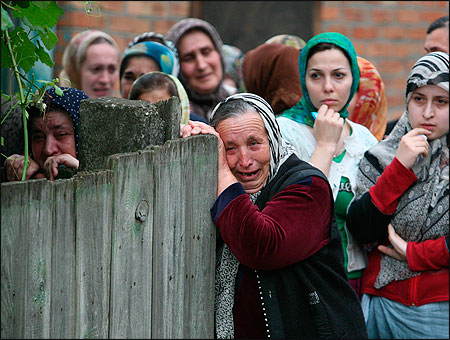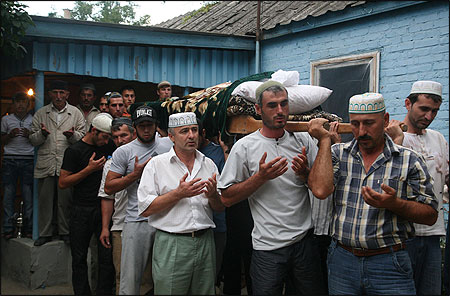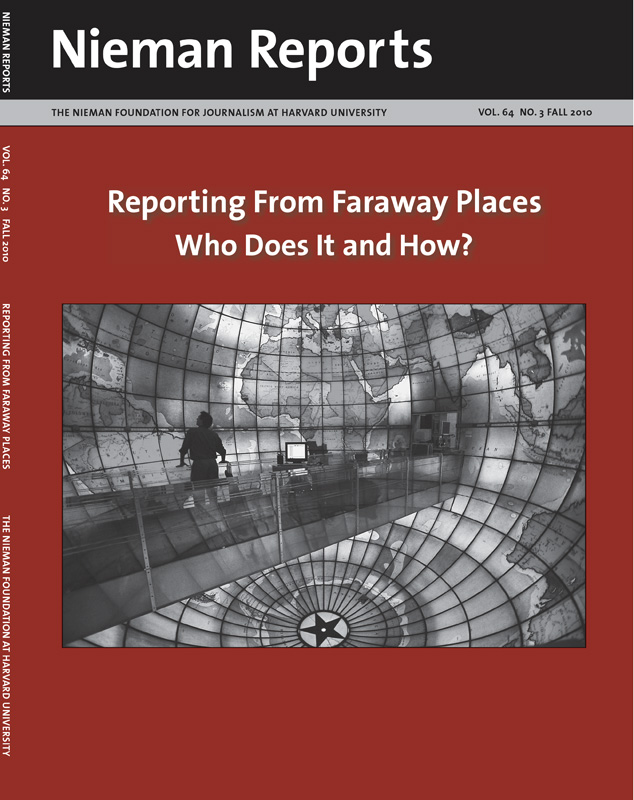
Women grieve during the burial in August 2009 of slain Chechen human rights activist Zarema Sadulayeva. Her bullet-riddled body was found a day after she was kidnapped. Photo by Musa Sadulayev/The Associated Press.
French journalist and author Anne Nivat has traveled to war-torn Chechnya very frequently during the last decade. Since the republic’s second war with Russia broke out in 1999, she has covered the events in Chechnya by blending in with the local population and sharing the danger and despair of their lives. In her book, “Chienne de Guerre: A Woman Reporter Behind the Lines of the War in Chechnya,” she told of the nine months she spent there during the war.
In September 2009, 10 years after the beginning of what Moscow officials still call an “anti-terrorist operation,” Nivat returned to Chechnya to see for herself the spirit of the “after-war” situation so she could write a story for Le Point, a weekly French magazine. What she found was a place that she says is “frozen in time and more violent and chaotic than ever.”
Nivat spoke with Nieman Reports editor Melissa Ludtke about what happened when a car in which she was riding was stopped at a checkpoint outside of Grozny. At the time, she was traveling with the parents of her nanny who had received political asylum in France. Nivat was dressed as a Chechen woman, wearing a long skirt and a veil that nearly covered her hair, “the way they wear it in Chechnya,” she explained. After the officer examined her French passport—and took it from her—a man got into their car and drove away with her and her nanny’s mother in the back seat, leaving the father at the checkpoint. Nivat described what happened next:
Looking at him, I saw that he was not wearing any uniform. He was dressed like a civilian, but he had a weapon. Speaking in Russian, I asked him many times the same question, “Who are you? Introduce yourself, please. Who are you? Where are you driving me? I am a citizen of France. Where is my passport?”
Here I was without my passport in this car, not knowing where I was going, with an unknown driver, who was refusing to answer my questions and who was wearing a weapon. The guy was extremely nervous and shouted at me in Russian, “Shut up. Shut up. I won’t talk to you.” Nevertheless, I kept asking, “Who are you? I am Anne Nivat. I am French. I am a reporter. Where is my passport? Where are you driving me?” And I said to him, “What you are doing is illegal.”
No answer.
I took my cell phone and dialed the number of a friend of mine who is a Chechen woman, one of my many friends in Grozny, to let her know what was happening. In front of this guy I explained to her everything in Russian. Of course he heard when I said, “I don’t know who he is; he is armed. Maybe it’s a kidnapping. How do I know?”
I was also thinking that this was exactly the same way that two different women working for nongovernmental organizations (NGOs) in Chechnya—Zarema Sadulayeva and Natalia Estemirova—had been killed a few months earlier.
My friend said, “Give him your phone. I want to talk to him.” With his left hand, he took the phone while he drove. This car was a very old car; he was driving very fast. Everything was very hectic. I heard my friend start introducing herself to him in Chechen but he refused to talk to her and tried to switch off my phone yet he didn’t know how. He stopped the conversation without having said a word to her.
And he did not give my phone back to me.
So you can imagine my situation. Now I was without any possibility to contact the outside world. The guy kept driving in a totally mad way and I was saying to myself, “If this guy is not giving back my phone to me, that means that he has something in mind, something not good, because how come he doesn’t give me my phone back? How come he doesn’t want to explain who he is?”
It was really a terrible situation.
I was trying to think about how to act, what to tell him in order to force him to explain what he was doing. I was lucky enough to speak the same language as he does, but he didn’t want to talk to me. I kept telling him, “What you are doing is totally illegal. Give me back my phone. Give me back my phone. Who are you? Who are you?” And the phone kept ringing, because, of course, my friend, who works for an NGO in Grozny, thought I had already been killed and she was trying to get in touch with him.
I repeated to the guy, “I am a citizen of France. If you don’t allow me to answer this phone, people will get very anxious. Don’t you understand that? Let me answer the phone, let me answer my phone.” Of course he didn’t care at all.
At a certain point we started fighting because I thought I should get my phone back by force. For him it was not easy because he was driving. I saw his pistol between his legs. At a certain point he stopped the car in the middle of nowhere to the right side of the road. He opened his door and took his weapon in his hand. I was watching every single move of his. I knew he was coming to me. He walked along the car to my door, which was the back right seat door. He opened it violently. I remember the vision of a sunny late afternoon in September, and this was an uncultivated place, and I sort of noticed just that and I said to myself, “This is the place where I’m going to die. This is the last thing I’m going to see in my life.”
I also thought, “I’m going to get killed in front of an old woman who happens to be the mother of the woman who is taking care of my child.” This is what I thought about as he was shouting at me. All the minutes before I so much wanted him to talk to me, but at this time I was so obsessed and preoccupied with what he was about to do that I didn’t pay attention to what he was saying. He was insulting me, telling me to get out of the car.
Here we were face to face and I was staring at his hand. He had the gun in his hand, and I know this kind of gun, it’s a Russian-made gun. I heard the click of when it’s ready. He unlocked it. There was no security anymore.
I said to myself, “Even if he doesn’t want to kill me, now he might kill me by mistake.” He put the gun on my belly; he touched me. I’m recounting the story slowly, but it all happened very quickly. I just remember what I told him, I said to him in Russian, “I beg you. I am begging you, please. I beg you don’t do anything to me because I am the mother of a young boy. That’s his picture on the phone.”
He finally slowly went back to his seat. He had probably seen the picture on my phone. That’s probably why he didn’t do anything. I have no idea if it’s because of what I told him. I will never know the reason.
We continued driving.
Now it was exactly the same problem except that I was much more quiet in the car. I couldn’t speak anymore. I was terrified, but eventually we arrived on the outskirts of Grozny. At a certain point he was about to stop the car so I opened the door and rushed out. But I couldn’t make a move because all of a sudden there were many men like him around me, not wearing uniforms but carrying weapons.
I could see only one man in uniform, so I addressed him, “Major, major (which is a military rank in Russian). Please, who are you? What’s happening? This guy almost killed me. What’s happening?” He took me and put me into another car in which he was riding, and when I got into that car I saw my nanny’s father sitting next to him.
This guy in uniform eventually gave me his last name and told me we were going to the immigration department “to check you.” I said, “OK. But who is this guy who took me? Who is he representing? He almost killed me.”
He remained silent. Here I was clueless in another car but I was less anxious because at least the guy had told me where we were going. I was still without my passport and without my phone. At this place I met with officers who were not carrying weapons, which was much more comfortable for me. They accused me of not having registered with a police department within 72 hours of entering Russia, which I had done—and I had a stamp on my passport showing I’d done it. This is required of a foreigner. They were trying to find anything to legitimize what they’d done to me.
In the meantime, I didn’t know what had happened to my friend, the one whom I had called for help. It turned out that she had called the maximum people she could in the minimum of time because she knew that’s how it starts. She knew on which road I had gone. I never go somewhere without saying where I’m going. Chechnya is small and there’s just one road going in each direction. She also had called, among others, the member of Chechnya’s Parliament whom I had interviewed two days earlier. She was sure that he would somehow help because he had seen me. She told him the story and specified that it would be very bad if something happened to me. He finally showed up at the immigration department while I was there.
I still was very confused about who was doing what and what was the meaning of all of this. It was difficult to find out who was behind it. I never saw again the guy who had threatened me with his weapon—he just vanished. My passport and my cell phone came back somehow. I don’t know through whom, but they were given back to me.
Then the guy in the uniform showed up again and he had a little talk in Chechen with the Parliament member. They talked in Chechen in front of me because they didn’t want me to understand their discussion. They knew I don’t understand Chechen.
By then colleagues of my friend whom I’d called from the car were present and later translated for me what these two men said to each other. “We had been given an order to stop this car and this young woman in particular inside the car,” said the uniformed guy. So it was not by chance: someone somehow gave an order.
That’s all I know, and I will not try to find out more because I know this is hopeless. I will never learn the name of the guy who did that to me. I will never know who he was. My guess is that he was some kind of a special security officer working for the Chechen government. He was not a private guy, he was a representative of the state.
So the lesson is that in Chechnya today, 10 years after this war started, we find this sort of violence from the very people who are supposed to defend the citizens. It gives you an idea of the level of arbitrary lawlessness in this place. It is a level not reached before. I have in-depth experience of this country, and I can tell you that it is a very bad sign. It is a sign that absolutely anything can happen in Chechnya today … and is happening.
What happened to me is happening all the time to Chechen people who are also asking questions. Not only journalists, but citizens asking questions.
While researching my story I spoke to someone who had said something very intelligent to me. He said, “Why is it that the Chechen people still don’t know the names of the people who are committing terrorist acts in the middle of the capital? Why is it that the police don’t tell us who they are under the pretext that there is an inquiry going on? In fact, everything is erased as if it never happened.” This person went on to say, “We are a very small population and we would like to know what led these people to kill themselves and to kill others. What led them to commit those terroristic acts that are not in the tradition of our society?”
Those kinds of questions are very common in Chechen society today. People want to know what’s happening. But they receive no answer to any questions. Everything is kept secret to pretend that everything is all right and under control. Nothing is under control. Nothing.
Well, the state of censorship is under total control, yes. Chechnya is part of Russia, and Moscow pretends that the Russian society is an open society, a democratic society, and that all the problems have been solved in Chechnya. What has been solved? People live with such a level of fear that I’ve never experienced in my life as a war correspondent. Some elderly people in Chechnya even compare it to the 1930’s in Russia.
I was in Chechnya a decade ago during the peak of the war when the level of fear was the level typical of wartime. War activity provokes that. What I have spent my time as a reporter looking at here—and in Iraq and in Afghanistan—is what happens next. What is happening behind the facade of a war terminated? Most of the time the people controlling the situation don’t want any witnesses from any country and of any nature, neither journalist nor NGO people, nobody. During the war, these people know other people will be watching. But after the war they believe that no one should be a witness, that no one should see what’s happening and be able to talk about it.

The body of slain Chechen human rights activist Natalia Estemirova is carried to a cemetery for burial in July 2009. Photo by Musa Sadulayev/The Associated Press.



